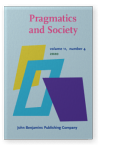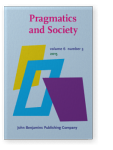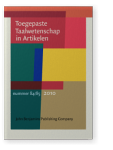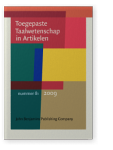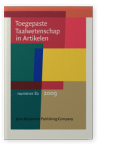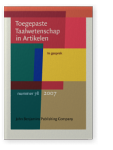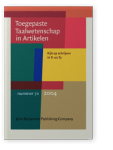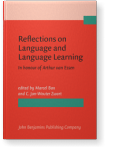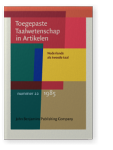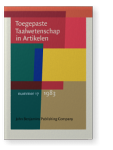Jan Berenst
List of John Benjamins publications for which Jan Berenst plays a role.
2020 Text selection proposals in dialogic reading in primary school Pragmatics and Society 11:4, pp. 591–614 | Article
In dialogic reading during inquiry learning in primary school, pupils read, think and talk together about text fragments for answering their research questions. This paper demonstrates from a conversational analytic perspective, how the shared activity of text selection is constructed in a goal… read more
2015 Shared reading at kindergarten: Understanding book content through participation Pragmatics and Society 6:3, pp. 367–397 | Article
This paper presents a single case-study of a longitudinal shared reading programme that took place in Dutch kindergartens with first language speakers of 4 to 6 years old. As will be shown, children participate both in a traditional instructional structure and in a participation framework… read more
2010 De Interactie Tussen Leiding en Kinderen En Tussen Kinderen Onderling in Twee Verschillende Typen Buitenschoolse Opvang Toegepaste Taalwetenschap in Artikelen 84/85, pp. 135–144 | Article
In this paper we will show how different types of after-school day care (bso) influences discourse between caretakers and children. In field research carried out in the context of a PhD-study on the social development and discourse practices of young children in after-school day care, a continuum… read more
2009 Participeren Tijdens het Voorlezen van Prentenboeken in de Kleuterklas: Een Pilot-Study Toegepaste Taalwetenschap in Artikelen 81, pp. 53–63 | Article
This paper describes a pilot-study that explores situated learning at kindergarten. By whole-class shared book reading, children get to know several participation frame-works, in which they gradually learn to participate during a longitudinal reading-aloud program. Using qualitative conversation… read more
2009 De Ontwikkeling Van Een Instrument Voor Het Meten Van De Voorleeservaring Van Kleuters Toegepaste Taalwetenschap in Artikelen 82, pp. 69–80 | Article
When children enter school at the age of four, they are expected to differ in their experience with reading-aloud of picture books and stories. Experience with reading-aloud influences their further development. Therefore, insight in the amount of experience with reading-aloud is useful. Until… read more
2007 Leerzame Gesprekken? Interacties met kleuters tijdens voorleessessies In gesprek, pp. 85–94 | Article
Kindergarten teachers who are talking with their nursery children during picture book reading about social and emotional themes, speak about the experiences and emotions of book characters, but also about the feelings of the children themselves. In both contexts the teachers tend to structure the… read more
2004 Spreken En Schrijven Van Kinderen: Een Vergelijking Van Contextualeringspraktijken In Narratieven Kijk op schrijven in T1 en T2, pp. 33–46 | Article
The relationship between children's oral and written language use may be considered as one of the main issues in the study of literacy development. In this paper, the focus is on how 10-year-old children (grade 5) create a textual context in oral and written narratives for their recipients. The… read more
2001 13. Literacy in Dutch of poorly schooled adult immigrants from the Netherlands Antilles Reflections on Language and Language Learning: In honour of Arthur van Essen, Bax, Marcel and Jan-Wouter Zwart (eds.), pp. 171–184 | Chapter
1985 Communicatief Tweede-Taalonderwijs: Onderzoek en Interventie Nederlands als tweede taal, pp. 94–104 | Article
Language acquisition research is dominated by three major hypotheses: the innate hypothesis, the cognitive hypothesis and the interactive input hypothesis. An attempt is described to find support either for one of the first two or for the third hypothesis in a pilot study of the effects of two… read more
1983 Taal- en Sprekersbeoordeling Binnen En Buiten De Eigen Groep Toegepaste Taalwetenschap in Artikelen 17, pp. 28–57 | Article
Social status of and solidarity between participants in interaction are important for the way in which they formulate speech acts. The use of a particular language variety functions as a cue for the assessment of status and solidarity in intergroup interaction between strangers: speakers of a… read more
